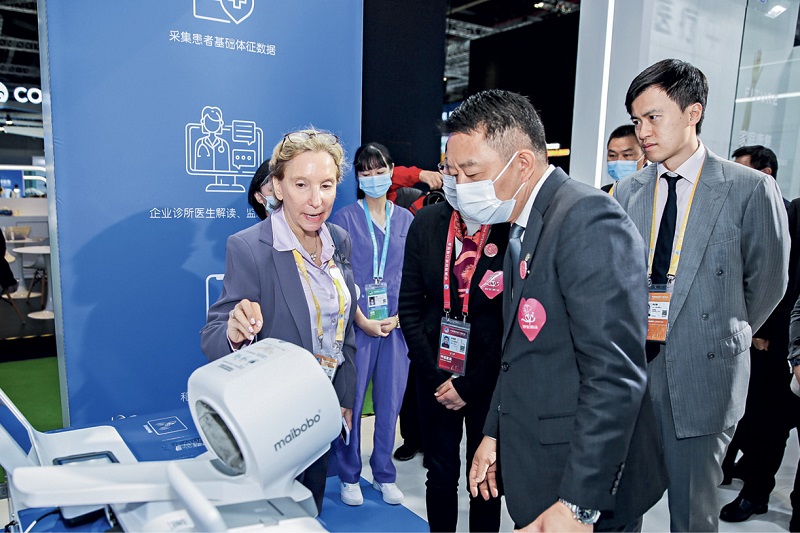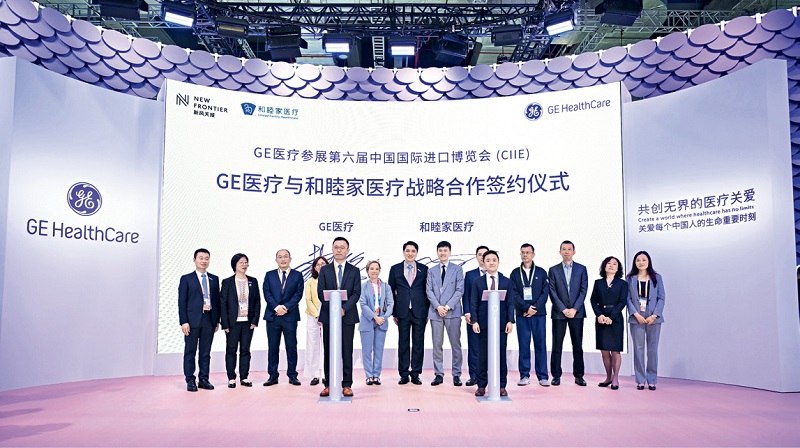American entrepreneur Roberta Lipson’s China story goes back to the 1970s, when China-United States relations began to thaw after the then U.S. President Richard Nixon made a historic visit to China. Founder of United Family Healthcare (UFH), an international hospital and clinic network, Lipson is among the first group of foreigners doing business in China since the country’s reform and opening-up. Recently, she has just returned from another historic event, the sixth China International Import Expo (CIIE) in Shanghai.
When the curtain closed on the five-day expo on November 10, it had consolidated its status as an economic powerhouse by breaking previous records with tentative deals worth US $78.41 billion reached for one-year purchases of goods and services, a 6.7-percent surge from the previous CIIE. Also, the American Food and Agriculture Pavilion marked the first official U.S. participation in this major import fair since its inception in 2018. Over 200 American companies attended the event, the highest number in the history of the CIIE.
With China-U.S. business ties strengthening despite political frictions, Lipson, who is also vice chair of the American Chamber of Commerce in China (AmCham), spoke about the role of the fair in expanding international cooperation, the growth of healthcare in China, and her own adventure starting a business in a foreign country.
“We can strongly feel the rapid development of China’s healthcare sector at the CIIE. The great fair has helped us expand our cooperation ecosystem and better serve a healthy China,” she said, calling the CIIE a platform for multinational companies to showcase their innovative achievements and an important opportunity to promote advanced technologies in China.
“China has a population of over 1.4 billion. The large size of the Chinese market and its gradually open and transparent business environment have attracted American companies.”
This year, the UFH signed cooperation agreements with multinational pharmaceutical companies, such as GE HealthCare, Siemens Healthineers, Novartis, and Roche, to explore innovative solutions to disease prevention and control.

Roberta Lipson (left, first) introducing the function of a medical device for the collection of basic patient data at the UFH pavilion, during the fourth CIIE in Shanghai in 2021.
Navigating Unfamiliar Waters
In 1972, then U.S. President Richard Nixon made an ice-breaking trip to China, which resulted in the establishment of diplomatic relations between the two countries in 1979.
Lipson had a keen interest in this Oriental country on the other side of the Pacific Ocean. As a university student, she studied Chinese history and language, which prepared her for a visit to China, a country ready to open its door to the outside world.
In 1979, Lipson’s dream came true. The American company she worked for sent her to China to expand its business. The 24-year-old arrived in Beijing, and began her first visit to China. “I could see almost all types of transportation on the streets: carriages, donkey carts, bicycles, and a few cars,” she recalled.
In the late 1970s, the United States was using an advanced technology, B-scan ultrasonography, to check fetal growth in pregnant women and to diagnose diseases of the heart and other internal organs, but it was not available in China where medical technology and hospital facilities were relatively backward. Even the best Chinese hospitals used old equipment. After seeing the condition of using outdated medical equipment, Lipson was determined to bring in advanced medical equipment from the United States.
She will always remember the day the first real-time B-ultrasound instrument was shown to Chinese doctors. More than 600 obstetricians saw the fetus moving in the mother’s womb on screen and many in the audience’s eyes glistened with tears of happiness. “Previously they could only rely on their hands to sense the dynamics of the fetus, but now they could see a real time image of this new life,” she said.
In late 1981, Lipson founded her own company, Chindex International, which introduced new medical devices to China, including high-end ultrasound scanners, laser instruments, and surgical robots. They have many firsts to their credit: bringing in the first ultrasound detector, the first central monitoring system, and the first MRI machine, and later the first surgical robots.
China’s birth rate rose rapidly in the 1990s, but many obstetric hospitals lacked beds. Lipson saw an opportunity there and applied to open a private hospital in China as a foreign investor.
At that time, China was still charting out its course to an open market and Lipson remembers how hard it was to get a government approval before the hospital could be opened. In 1997, the first foreign-funded private hospital in China – United Family Healthcare – was established in Beijing.
“At the very beginning, all our patients were foreign diplomats or executives of international companies in China. Today, more than 80 percent of the patients are Chinese, fueled by the increase in Chinese consumers’ spending power and their pursuit of a high-quality life, in all aspects, including healthcare, ,” Lipson said. She attributed China’s incredible progress in making a variety of healthcare available to the public, to both government and private investment, as well as an increasingly open attitude toward international cooperation and investment.
Population + Policies = Tremendous Change
China’s business environment has made significant progress, evidenced by the rapid growth in the number of foreign-funded enterprises. The American Chambers of Commerce now represents more than 900 American enterprises in China.
UFH started operating in Beijing, and has recently increased its investments there, thanks to its open environment and investment policies, especially the Beijing municipal government’s “two zones” policies in recent years, which enable investors to benefit from the pilot free trade zone and the national comprehensive demonstration zone for expanding opening-up in the service sector. The policies reflect Beijing’s inclusive attitude and international atmosphere, and have been instrumental in attracting more talent and capital from domestic and foreign enterprises.
UFH now runs four hospitals and 11 clinics in Beijing. Besides, it has also opened hospitals and clinics in other first-tier cities of China, such as Shanghai, Guangzhou, Shenzhen, and Hong Kong, making it China’s largest private healthcare service provider that serves millions of patients. UFH is now in the process of planning its newest and largest project – a low carbon footprint, environmentally friendly comprehensive medical center in Beijing with an aim to promote sustainable development in the medical and health sector. The new hospital will combine activities in clinical medicine, teaching and transnational research on one campus.
Lipson is struck by the developments in China’s medical field. Changes in the demographic structure are triggering new and diversified healthcare demands, generating a market with huge potential in medical services and driving innovation in medical institutions.
Over the past 40 years, China has undergone tremendous changes. For example, the average life expectancy has almost doubled to 78.2 years since the founding of the People’s Republic of China in 1949; the maternal mortality rate has decreased by about 10 times to 15.7 per 100,000 in 2022.
However, like any other country, China also faces many challenges. As Lipson pointed out, it has the world’s largest number of patients and the highest incidence of cancer. It also faces the problems of a severely aging population and high incidence of chronic diseases.
In Lipson’s eyes, the “healthcare” idea that the UFH promotes is of greater significance than it’s modern buildings and state-of-the-art equipment, as it gives importance to both health and care.

A signing ceremony is held between UFH and GE HealthCare at the sixth CIIE in Shanghai, on November 7, 2023.
Magic of Multi-Level Exchanges
Although China-U.S. relations have suffered setbacks in recent years, Lipson is optimistic about the bilateral cooperation for three reasons. First there are frequent meetings between the top leaders and ministerial officials of the two countries; second, bilateral cultural and people-to-people exchanges are increasing; and third, China is rolling out preferential policies to facilitate foreign investment.
One example of that is a document released by China’s State Council on August 13, 2023 on further optimizing the foreign investment environment and increasing efforts to attract foreign investment.
The document has been welcomed by the international business community, including U.S. investors. “The sustained recovery of the Chinese economy and the continued opening of communication channels between China and the U.S. will further enhance the confidence of the American business community in China. For many of our members, China is the most important investment destination, and most of them will continue to invest and do business here, with full confidence in China’s development,” Lipson said.
In many industries, China and the U.S. are each other’s first and second largest trading partner. Therefore, maintaining friendly and cooperative relationships and ensuring sustainable development are crucial to both.
“Over the past few months, we have seen the governments of both countries make arduous efforts to rebuild trust and put their relations back on track,” she said. “The high-level exchanges of visits between Chinese and American ministers, as well as the meeting at APEC of the two countries leaders, not only involve politics but also business, making us realize the importance of China-U.S. cooperation for the two countries’ economies.”
U.S. Commerce Secretary Gina Raimondo’s recent four-day visit to China achieved some results, which the official called a “big step forward.” U.S. Secretary of State Antony Blinken and Secretary of the Treasury Janet Yellen also visited China this year, meeting with U.S. business people including Lipson, and listened to their opinions and suggestions on China-U.S. relations and economic and trade cooperation. In addition, many heads of major American companies have visited China.
Lipson believes that face-to-face communication is very important for bilateral ties. Both Americans and the Chinese have benefited from close cooperation.
“I am very optimistic about the future of bilateral relations,” she said. “I believe that as long as we can maintain open, honest and transparent communication, we will embrace a much better and brighter future.”